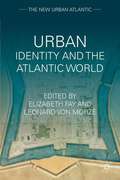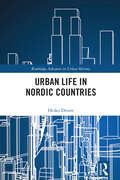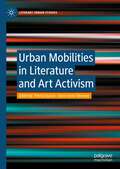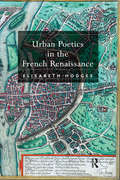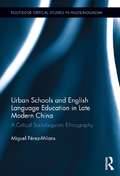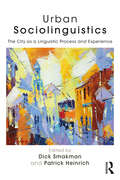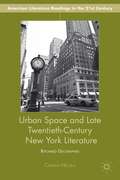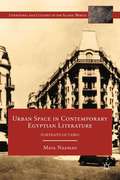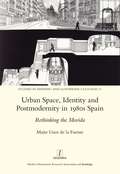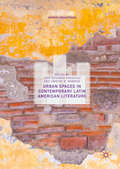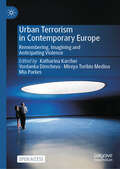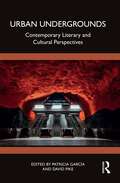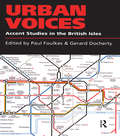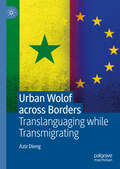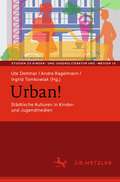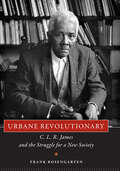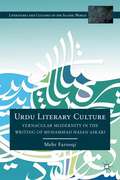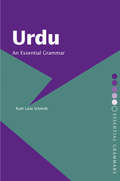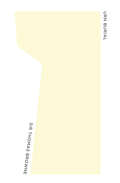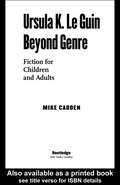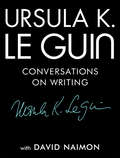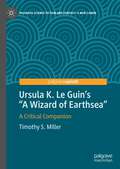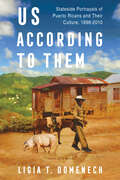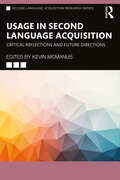- Table View
- List View
Urban Identity and the Atlantic World (The New Urban Atlantic)
by Elizabeth A. Fay Leonard Von MorzéThe constant flow of people, ideas, and commodities across the Atlantic propelled the development of a public sphere. Chapters explore the multiple ways in which a growing urban consciousness influenced national and international cultural and political intersections.
Urban Life in Nordic Countries (Routledge Advances in Urban History)
by Heiko DrosteBased on empirical studies, this book investigates the particular urban history of the North from the 17th century until today in a comparative, Northern perspective. Urban Life in Nordic Countries is the result of a conference on "Urbanity in the Periphery" held in Stockholm on the occasion of the 100th anniversary of the Institute of Urban History at Stockholm University, aimed at establishing the field of the urban history of the North and creating a network of urban historians of the North. With a broad range of contributions from Sweden, Finland, Denmark, Norway, and Estonia, the volume seeks to further discourse on the region within national and transnational lenses, and to highlight possibilities for new cooperation among researchers. Urban history is a transdisciplinary subject, engaging not only historians but also ethnologists, sociologists, urban planners, and cultural geographers, and this book targets all scholars whose work requires a historical understanding of the Northern town. European urban historians outside the region will also find this text valuable as one of the few studies to consider the urban history of the continent from a North-centered viewpoint.
Urban Mobilities in Literature and Art Activism (Literary Urban Studies)
by Patricia García Anna-Leena ToivanenUrban Mobilities in Literature and Art Activism explores the entwinement of mobility and immobility in urban spaces by focusing on their representation in literary narratives but also in visual and performing arts. Across a range of geographical contexts, this volume builds on the new mobilities paradigm developed by literary scholars, sociologists and human geographers. The different chapters employ a cohesive framework that is sensitive to the intersecting dimensions of power and discrimination that shape urban kinetic features. The contributions are divided into three sections, each of which places the focus on a different aspect of urban mobility: Itinerant Subjects, Modes of Transport and Places of Transit, and Urban Liminalities.Chapter 7, "Alienation, Abjection and the Mobile Postcolonial City: Public Transport in Ousmane Sembène’s “Niiwam” and Yvonne Vera’s Without a Name" is available open access under a Creative Commons Attribution 4.0 International License via link.springer.com.
Urban Poetics in the French Renaissance
by Elisabeth HodgesThe 'city view' forms the jumping off point for this innovative study, which explores how the concept of the city relates to the idea of the self in early modern French narratives. At a time when print culture, cartography and literature emerged and developed together, the 'city view', a picture or topographic image of a city, became one of the most distinctive and popular products of the early modern period. Through a construct she calls 'urban poetics', Elisabeth Hodges draws out the relationship between the city and the self, showing the impact of the city in cultural production to be so profound that it cannot be extricated from what we know by the name of 'subjectivity'. Each chapter of the book brings focus to a crucial text that features descriptions of the self in the city (by the writers Villon, Corrozet, Scève, and Montaigne) and investigate how representations of urban experience prepared the way for the emergence of the autonomous subject. Charting a course between cartography, literary studies, and cultural history, this study opens new vistas on some of the period's defining problems: the book, the subject, the city.
Urban Schools and English Language Education in Late Modern China: A Critical Sociolinguistic Ethnography (Routledge Critical Studies in Multilingualism)
by Miguel Perez-MilansShortlisted for the 2014 BAAL Book Prize This book explores the meaning of modernization in contemporary Chinese education. It examines the implications of the implementation of reforms in English language education for experimental-urban schools in the People’s Republic of China. Pérez-Milans sheds light on how national, linguistic, and cultural ideologies linked to modernization are being institutionally (re)produced, legitimated, and inter-personally negotiated through everyday practice in the current context of Chinese educational reforms. He places special emphasis on those reforms regarding English language education, with respect to the economic processes of globalization that are shaping (and being shaped by) the contemporary Chinese nation-state. In particular, the book analyzes the processes of institutional categorization of the "good experimental school", the "good student", and the "appropriate knowledge" that emerge from the daily discursive organization of those schools, with special attention to the related contradictions, uncertainties and dilemmas. Thus, it provides an account of the on-going cultural processes of change faced by contemporary Chinese educational institutions under conditions of late modernity. Winner of The University of Hong Kong's Faculty Early Career Research Output Award for outstanding book publication, by the Faculty of Education
Urban Sociolinguistics: The City as a Linguistic Process and Experience
by Dick Smakman Patrick HeinrichFrom Los Angeles to Tokyo, Urban Sociolinguistics is a sociolinguistic study of twelve urban settings around the world. Building on William Labov’s famous New York Study, the authors demonstrate how language use in these areas is changing based on belief systems, behavioural norms, day-to-day rituals and linguistic practices. All chapters are written by key figures in sociolinguistics and presents the personal stories of individuals using linguistic means to go about their daily communications, in diverse sociolinguistic systems such as: extremely large urban conurbations like Cairo, Tokyo, and Mexico City smaller settings like Paris and Sydney less urbanised places such as the Western Netherlands Randstad area and Kohima in India. Providing new perspectives on crucial themes such as language choice and language contact, code-switching and mixing, language and identity, language policy and planning and social networks, this is key reading for students and researchers in the areas of multilingualism and super-diversity within sociolinguistics, applied linguistics and urban studies.
Urban Space And Late Twentieth-century New York Literature
by Catalina NeculaiInterdisciplinary in nature, this project draws on fiction, non-fiction and archival material to theorize urban space and literary/cultural production in the context of the United States and New York City. Spanning from the mid-1970s fiscal crisis to the 1987 Market Crash, New York writing becomes akin to geographical fieldwork in this rich study.
Urban Space in Contemporary Egyptian Literature
by Mara NaamanThis book is an examination of how the space of the downtown served dual purposes as both a symbol of colonial influence and capital in Egypt, as well as a staging ground for the demonstrations of the Egyptian nationalist movement. It is through the lens of literature, in this case a body of texts that form an archive on the downtown, that one is able to understand the layered significance of this space for multiple generations of Egyptians.
Urban Space, Identity and Postmodernity in 1980s Spain: Rethinking the Movida
by MariteUsozdela FuenteDuring the 1980s, the urban youth movement known as la movida transformed the Spanish cultural landscape, particularly in the country's capital, Madrid. After a four-decade long dictatorship, artists and thinkers sought to make the most of their newly found freedoms. The vibrancy, optimism and aesthetic heterogeneity of the period are best captured in contemporary ephemera - in the fanzines and magazines that provided movida participants with an immediate and largely unmediated outlet for their creative experiments. Among them, monthly arts magazine La Luna de Madrid is arguably the most iconic, and its preoccupation with urban space, identity, and postmodernity suggests that la movida was indeed more than 'just a teardrop in the rain', as some of its critics have suggested.
Urban Spaces in Contemporary Latin American Literature (Hispanic Urban Studies)
by Timothy R. Robbins José Eduardo GonzálezThis collection of essays studies the depiction of contemporary urban space in twenty-first century Latin American fiction. The contributors to this volume seek to understand the characteristics that make the representation of the postmodern city in a Latin American context unique. The chapters focus on cities from a wide variety of countries in the region, highlighting the cultural and political effects of neoliberalism and globalization in the contemporary urban scene. Twenty-first century authors share an interest for images of ruins and dystopian landscapes and their view of the damaging effects of the global market in Latin America tends to be pessimistic. As the book demonstrates, however, utopian elements or “spaces of hope” can also be found in these narrations, which suggest the possibility of transforming a capitalist-dominated living space.
Urban Terrorism in Contemporary Europe: Remembering, Imagining and Anticipating Violence
by Katharina Karcher Yordanka Dimcheva Mireya Toribio Medina Mia ParkesThis open access book sheds light on collective practices of remembering, imagining and anticipating in relation to recent acts of urban terrorism in Europe. Analysing a range of personal and collective responses to urban terrorism in contemporary Europe, this book shows that current debates on this issue are shaped by multiple co-existing and intersecting memories of political violence in the past. Moreover, despite public declarations of unity and solidarity, collective memories of urban terror in contemporary Europe are far from consensual - memory can be both a catalyst for and an impediment to social and political change. Drawing on case studies from a range of European countries and creative responses by survivors, artists, and poets, this interdisciplinary volume introduces readers to key methods (e.g. discourse analysis and (auto-)ethnography) and concepts (e.g. Lieux de Mémoire and ‘grassroots memorials’) for the study of the memoralization of terror attacks.
Urban Undergrounds: Contemporary Literary and Cultural Perspectives
by David Pike Patricia GarcíaResearch in urban development in the social sciences has increasingly emphasized the importance of underground infrastructure for envisaging sustainable cities and for critiquing the economies of extraction. Urban Undergrounds: Contemporary Literary and Cultural Perspectives demonstrates the urgency of integrating a below-ground perspective into the emerging field of the Urban Humanities.The collection is divided into three thematic sections that cluster and revisit different sets of well-known motifs in Underground Studies: “Displaced”, “Buried” and “Wasted”. It showcases the intermedial nature of underground-focused analyses in literature, extending from literary texts to a wider range of cultural forms, including films, graphic novels and videogames. The contributors build on recent scholarship that has expanded the field into new interdisciplinary areas, including intersections with memory studies, ecocriticism and decolonial perspectives. Urban Undergrounds also explores lesser-studied subterranes, including those of Warsaw, Athens, Mexico City, Johannesburg and Santiago de Chile. The book’s substantial introduction offers a guiding theoretical and methodological framework for future scholars working with underground perspectives in literary and cultural studies.This thought-provoking and illuminating collection is a valuable resource for students and scholars in the areas of Literary Urban Studies, Underground Studies and Geocriticism, and more broadly in the Urban Humanities and Spatial Humanities.
Urban Voices: Accent Studies in the British Isles (A\hodder Arnold Publication)
by Paul Foulkes Gerard J. DochertyAccents and dialects are constantly undergoing small variations over time, but evidence shows that change may have become increasingly rapid in the past few decades. 'Urban Voices' presents one of the few recent surveys of this phonological variation and change in urban accents across Great Britain and Ireland.Each of the specially commissioned chapters is divided into two parts. The first provides a detailed description of accent features within one or more urban centres, including information on social and stylistic variation and ongoing change. The second discusses a range of current theoretical and methodological issues. Some chapters present wholly new data based on fieldwork carried out specifically for inclusion in 'Urban Voices', while others summarise data from well-known research, up-dated and reanalysed in accordance with new findings.Containing copious illustrative and pedagogic material, this textbook presents a clear pathway to state-of-the-art research for students of sociolinguistics, dialectology, phonetics, and phonology at advanced undergraduate and graduate level. In addition, the detailed descriptive data and the accompanying cassette constitute a valuable resource for students and teachers of English, clinicians and speech therapists, forensic phoneticians, researchers in speech recognition and speech synthesis, and actors.Contributors: Deborah Chirrey, Edge Hill University College / Beverley Collins, Rijks Universiteit Leiden, Netherlands / Gerard J Docherty, University of Newcastle, UK / Paul Foulkes, University of Leeds, UK / Nigel Hewlett, Queen Margaret College / Raymond Hickey, University of Essen, Germany / Paul Kerswill, University of Reading, UK / Anne Grethe Mathisen, University of Oslo, Norway / Kevin McCafferty, Universitetet i Tromso, Norway / Inger Mees, Copenhagen Business School, Denmark / Lesley Milroy , University of Michigan, USA / Mark Newbrook, Monash University, Australia / James M Scobbie, Queen Margaret College, UK / Jana Stoddart, Olomouc, Czech Republic / Jane Stuart-Smith, University of Glasgow, UK / Laura Tollfree, Monash University, Australia / Peter Trudgill, University of Fribourg, Switzerland / Alice Turk, University of Edinburgh, UK / Clive Upton, University of Leeds, UK / Dominic Watt, University of Leeds, UK / J D A Widdowson, University of Sheffield, UK / Ann Williams, University of Reading, UK.
Urban Wolof across Borders: Translanguaging while Transmigrating
by Aziz DiengThis book takes urban Wolof beyond Senegal to consider the effects of mobility on language and examine how the diasporans engage in their daily language practices as transmigrants. The parallel between languaging and migrating underpins the author's argument, as he examines the dynamicity of languaging at both micro and macro levels, as speakers navigate across spaces and languages. Moving away from a code-based approach, the author makes a compelling case that the urbanite, rather than shuttling between codes, deploys instead idiolectal features from a unique linguistic repertoire which comprises at once semiotic, cognitive, and language features. His indigenous approach affords novel perspectives in linguistic ethnography and complements the Euro-Western methodologies.
Urban!: Städtische Kulturen in Kinder- und Jugendmedien (Studien zu Kinder- und Jugendliteratur und -medien #13)
by Ute Dettmar Ingrid Tomkowiak Andre KagelmannAls literarischer Handlungsraum hat sich die Stadt, vor allem die Großstadt, sowohl mit Blick auf die Erzählformen als auch in den semantischen Zuschreibungen innerhalb von etwa 150 Jahren grundlegend gewandelt. Im kinder- und jugendliterarischen Umgang mit den urbanen Räumen werden Veränderungen der Konstruktionen von Kindheit und Adoleszenz ebenso manifest wie die Ausdifferenzierung der Erzählformen. Heute wird Stadt als ein plurales, vielstimmiges und vielschichtiges Gefüge dargestellt, das auch von sozialen Gegensätzen geprägt und von intersektionalen Grenzlinien durchzogen ist. Die Beiträge dieses Bandes untersuchen Dimensionen und Facetten der erzählten Stadt und geben einen Einblick in das thematische und formale Spektrum kinder- und jugendliterarischer Stadterkundungen. Dabei nehmen sie Kinder- und Jugendromane, Kriminalerzählungen, Dystopien und Fantasy, Lyrik und Theater in den Blick.
Urbane Revolutionary: C. L. R. James and the Struggle for a New Society
by Frank RosengartenIn Urbane Revolutionary: C. L. R. James and the Struggle for a New Society, Frank Rosengarten traces the intellectual and political development of C. L. R. James (1901–1989), one of the most significant Caribbean intellectuals of the twentieth century. In his political and philosophical commentary, his histories, drama, letters, memoir, and fiction, James broke new ground dealing with the fundamental issues of his age—colonialism and post-colonialism, Soviet socialism and western neo-liberal capitalism, and the uses of race, class, and gender as tools for analysis. The author examines the in-depth three facets of James’s work: his interpretation and use of Marxist, Trotskyist, and Leninist concepts; his approach to Caribbean and African struggles for independence in the 1950s and 1960s; and his branching into prose fiction, drama, and literary criticism. Rosengarten analyzes James’s previously underexplored relationships with women and with the women’s liberation movement. The study also scrutinizes James’s methods of research and writing. Rosengarten explores James’s provocative and influential concepts regarding Black liberation in the Caribbean, Africa, the United States, and Great Britain and James’s varying responses to revolutionary movements. With its extensive use of unpublished letters, private correspondence, papers, books, and other documents, Urbane Revolutionary provides fresh insights into the work of one of the twentieth century’s most important intellectuals and activists.
Urdu Literary Culture
by Mehr Afshan FarooqiThe book examines the impact of political circumstances on vernacular (Urdu) literary culture through an in-depth study of the writings of Muhammad Hasan Askari (1919 -78), Urdu's first and finest literary critic. Conceptually, the book melds the perspectives of literary studies and history since Askari's life was lived at the crossroads of early nation formation and the writing of literary and social history, both of which have played a generative role in the organization and articulation of politics in South Asia. The study provides a detailed treatment of the intellectual world that Askari inhabited: colonial and postcolonial India and Pakistan. Complicating an analysis of Askari's life and work is the fact of his living the life of a closeted gay. Farooqi analyzes f the ways in which Askari's sexuality filtered through his writing.
Urdu: An Essential Grammar (Routledge Essential Grammars)
by Ruth Laila SchmidtUrdu: An Essential Grammar is a reference guide to the most important aspects of the language as it is used by native speakers today.The complexities of Urdu are set out in short, readable sections. Explanations contain minimal jargon and emphasis has been placed on the aspects of Urdu that pose a particular challenge for English-speaking students.Features include:* language examples throughout in both Urdu script and romanization* user-friendly layout* detailed contents list* comprehensive index.Urdu: An Essential Grammar presents a fresh and accessible description of the language and will prove invaluable to students at all levels.
Urn Burial (New Directions Pearls)
by W. G. Sebald Thomas BrowneUrn Burial, one of the most influential essays in Western literature, is now available as a New Directions Pearl. Hydriotaphia, or Urn Burial, is one of the pinnacles of Renaissance scholarship and without doubt one of the great essays in English literature. Beginning with observations on the recent discovery of Roman antiquities in the form of burial urns, Browne's associative mind wanders to elephant graveyards, to pre-Christian cremation ceremonies, and finally to the idea of Christian burial. Browne then explores, with a more melancholic meditation, man's struggles with mortality and the uncertainty of his fate and fame in the living world. This edition includes a magisterial discourse on Sir Thomas Browne taken from the first chapter of W. G. Sebald's The Rings of Saturn.
Ursula K. Le Guin Beyond Genre: Fiction for Children and Adults (Children's Literature and Culture)
by Mike CaddenThis book critically examines Le Guin's fiction for all ages, and it will be of great interest to her many admirers and to all students and scholars of children's literature.
Ursula K. Le Guin's The Left Hand of Darkness (Modern Critical Interpretations)
by Harold BloomEssays by David Ketterer, Fredric Jameson, Donald F. Theall, Martin Bickman, Jeanne Murray Walker, Eric S. Rabkin, Barbara Brown, Victoria Myers, and Carol McGuirk.
Ursula K. Le Guin: Conversations On Writing (Library Of America Ursula K. Le Guin Edition Ser. #297)
by Ursula K. Le Guin David NaimonUrsula K. Le Guin discusses her fiction, nonfiction, and poetry?both her process and her philosophy?with all the wisdom, profundity, and rigor we expect from one of the great writers of the last century. When the New York Times referred to Ursula K. Le Guin as America’s greatest writer of science fiction, they just might have undersold her legacy. It’s hard to look at her vast body of work?novels and stories across multiple genres, poems, translations, essays, speeches, and criticism?and see anything but one of our greatest writers, period. In a series of interviews with David Naimon (Between the Covers), Le Guin discusses craft, aesthetics, and philosophy in her fiction, poetry, and nonfiction respectively. The discussions provide ample advice and guidance for writers of every level, but also give Le Guin a chance to to sound off on some of her favorite subjects: the genre wars, the patriarchy, the natural world, and what, in her opinion, makes for great writing. With excerpts from her own books and those that she looked to for inspiration, this volume is a treat for Le Guin’s longtime readers, a perfect introduction for those first approaching her writing, and a tribute to her incredible life and work.
Ursula K. Le Guin’s "A Wizard of Earthsea": A Critical Companion (Palgrave Science Fiction and Fantasy: A New Canon)
by Timothy S. MillerWritten not so long after "Tolkien mania" first gripped the United States in the 1960s, Ursula K. Le Guin's novel A Wizard of Earthsea (1968) has long been recognized as a classic of the fantasy genre, and the series of Earthsea books that followed on it over the next several decades earned its author both considerable sales and critical accolades. This new introduction to the text will closely contextualize the original novel in relation to its heady decade of composition and publication — a momentous time for genre publishing — and also survey the half century and more of scholarship on Earthsea, which has shifted in direction and emphasis many times over the decades, just as surely as Le Guin frequently adjusted her own sails when composing later works set in the fantasy world. Above all, this book positions A Wizard of Earthsea as perhaps an "old text" that nevertheless belongs in a "new canon," a key novel in the author's career and the genre in which it participates, and one that at once looks back to Tolkien and his own antecedents in masculinist early fantasy; looks forward to Le Guin's own continuing feminist and progressive education; and anticipates and indeed helped to shape young adult literature in its contemporary form.
Us According to Them: Stateside Portrayals of Puerto Ricans and Their Culture, 1898-2010
by Ligia T. DomenechThe acquisition of Puerto Rico as a colony in 1898 prompted the interest of many in the United States—the military, correspondents, investors, missionaries, politicians, scientists, and tourists. Wanting to know more about Puerto Rico, its inhabitants, and its potential utility, many of these curious but untrained observers visited the island and documented their experiences for the benefit of future visitors. Decades later, readers continue to revisit these writings and create new accounts that explore the “effects of American civilization” on Puerto Rican society.In Us According to Them: Stateside Portrayals of Puerto Ricans and Their Culture, 1898-2010, Puerto Rican historian Ligia T. Domenech exposes the distorted mirror turned on Puerto Rico, one constructed through the eyes of foreigners. Each of the eighteen chapters focuses on a different aspect of mainland US descriptions of Puerto Rican culture—from gender, race, and class to music, religion, and food. Accurate or not, books on Puerto Rico have contained perceptions about Puerto Ricans and their world that continue to shape opinions held by US citizens dwelling stateside. This book explores the lasting impacts of these repeated stereotypes on the collective understandings of both the colonizer and the colonized.
Usage in Second Language Acquisition: Critical Reflections and Future Directions (Second Language Acquisition Research Series)
by Kevin McManusThe study of “usage” has constituted a major line of second language learning research for decades now. The concept of usage, however, can be defined and studied in many different ways. In this comprehensive, forward-looking text, international scholars from a variety of perspectives review and critically examine current conceptualizations of usage, learning, and their connections in the field of second language acquisition (SLA). Bringing these diverse perspectives into conversation, Kevin McManus synthesizes the state of the art to set the agenda for new directions in theory-building and empirical SLA research. This text will be an invaluable resource to students and researchers in SLA, applied linguistics, psychology and cognitive science, education, and related areas.
